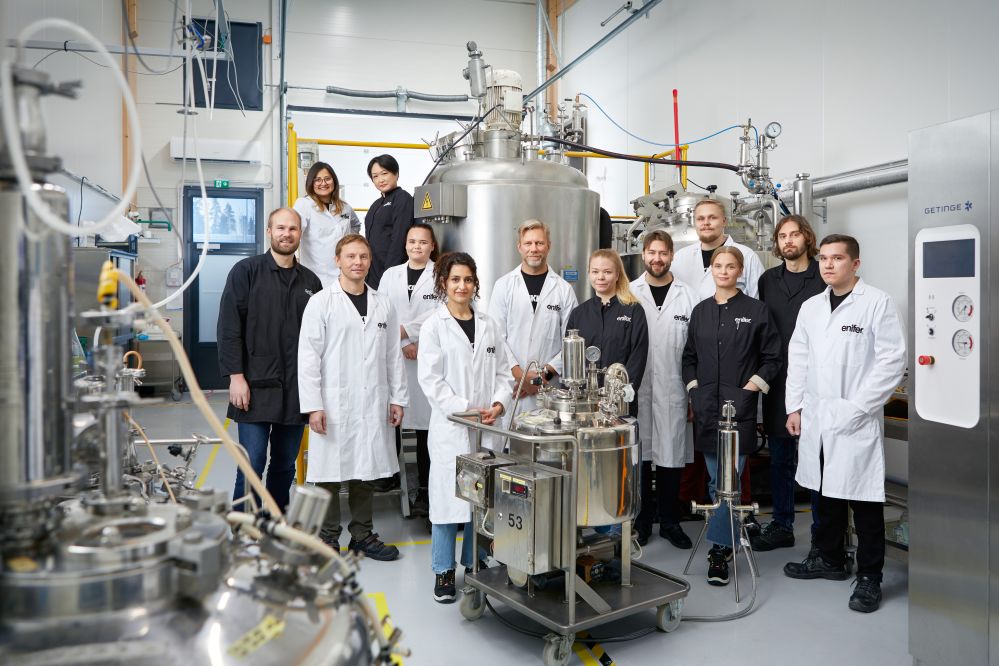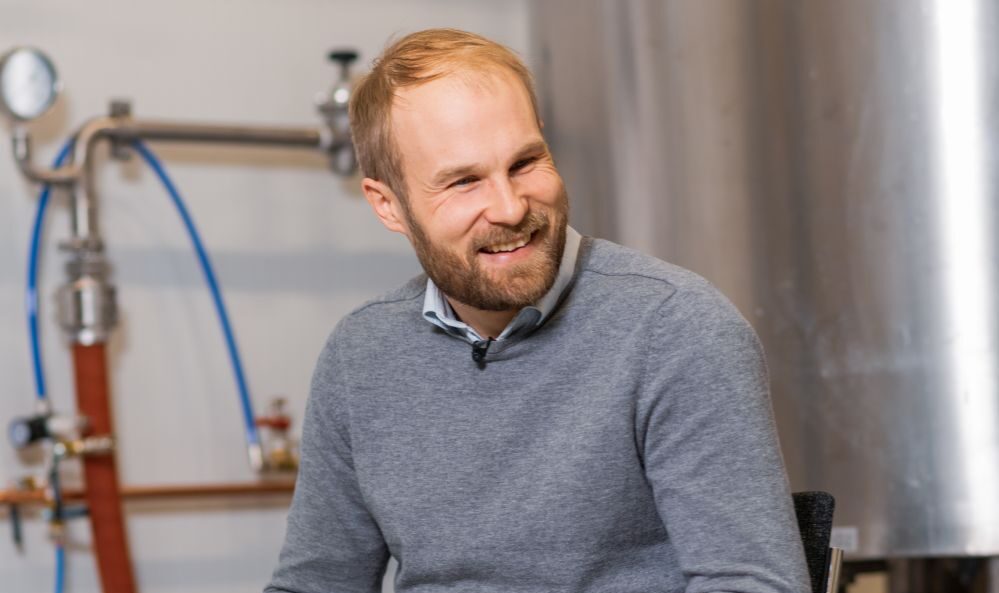Finnish startup Enifer has bagged a €12 million ($13.2 million) grant to help fund a large-scale facility growing a strain of mycelium (fungus) first commercialized as a source of pig and chicken feed 50 years ago.
The funding comes from the EU’s NextGenerationEU recovery instrument, which has allocated some capital to facilities promoting the reuse of industrial waste streams as part of its commitment to building a more circular economy. Enifer fits the bill as its mycelium can feed on a variety of industry waste streams instead of more standard—and costly—fermentation feedstocks such as sugar.
The mycoprotein—in commercial production from 1975 to 1991—is produced by the fungal strain Paecilomyces variotii KCL-24 (brand name ‘PEKILO’) and was historically fed with spent sulfite liquor, a by-product of paper making.
Enifer—a spinoff from the VTT Technical Research Centre of Finland founded in 2020 as eniferBio—uses the same fungi strain but has upgraded the process to produce food-grade ingredients (a protein- and fiber-rich powder with a neutral taste and color). Instead of sulfite liquor, it will be using lactose permeate from Finnish dairy partner Valio as its feedstock.
The mycoprotein will be targeted at markets in human food (up to 55% protein), petfood (60%+ protein), and aquaculture (up to 65% protein), says the firm, which has established partnerships with major players in the feed and food industry including Skretting, the aquafeed division of Nutreco, petfood giant Purina, and dairy giant Valio.

‘We’re working with an old innovation that has already been proven to work at scale’
The new factory in southwest Finland will be able to make 3m kilos (6.6m lbs) of protein per year and is projected to cost €30 million ($33 million). It is expected to be completed by the end of 2025, with production ramping up in 2026, according to the startup, which raised around €2.5 million in seed funding and grants followed by a €11 million ($12 million) series A round last year backed by Valio, Aqua-Sparks, Tesi, Voima Ventures and Nordic Foodtech VC.
“We’re currently doing basic engineering with [design and engineering company] AFRY. Thanks to the unique history of PEKILO, we can take this giant leap from our existing pilot directly to a commercial-scale facility,” Enifer cofounder and CEO Simo Ellilä told AgFunderNews.
“We’re working with an old innovation that has already been proven to work at scale. In Finland, the paper industry didn’t know what to do with its side stream after it was not allowed to dump it into lakes and rivers anymore. But it knew that fungi grows on it, and so after R&D, pilot tests and scale up, it built a commercial operation from 1975-1991 making pulping residue into sustainable protein for pigs and chickens.”
‘We had to find higher margin markets’
So why did the operation shut down?
“The acute reason was that the raw material from the pulp industry dried up, plus the engineering company that built it went bankrupt,” said Ellilä. “There were also various other factors [including the emergence of cheap soy imports that could compete with the mycoprotein in the feed market].
“We ran the math and realized that if we wanted to revive this process, we couldn’t just do exactly the same thing. If we were going to make this profitable, we had to find higher margin markets, so we have tweaked the growing conditions and also the feedstock to make products suitable for human, pet, and animal feed markets. So for the new plant we will use lactose that dairy companies want to offload, but we could also use other [upcycled] feedstocks. We’re able to tune the protein-to-carbohydrate ratio quite a bit.”
Meanwhile, using a strain that has already been commercialized has made things easier from a regulatory perspective, he added.
“Enifer has exclusive rights to the strain, which is naturally occurring, with no genetic engineering involved. We basically took that material package from the old factories and all the old animal studies to the European Commission and they agreed it’s safe for animal nutrition. So it’s approved for feed and petfood within the European single market and any jurisdiction that follows the EU such as Chile and Thailand. For food, we’re compiling a Novel Foods submission, which we plan to submit before the summer.”
‘We missed that whole investment hype cycle’
According to Ellilä: “We’re putting the whole financing package together now, which is going to include this grant, some more equity, and some loans, which we aim to finalize by the end of Q1.”
While this is not the optimal time to raise capital in the alt protein space, the fact that the PEKILO strain has been grown at industrial scale before de-risks the enterprise to some extent, such that Enifer can focus on the business case for the mycoprotein rather than having to prove its tech is scalable, he said.
“That fact [that it’s been done before] has been very valuable to us from the beginning. As we didn’t really get going until the beginning of 2021, we also missed that whole investment hype cycle. This is solid technology and we don’t have a hyped valuation.”
LOIs and MOUs… and working on solid offtake agreements
But what evidence is there that there is a market for PEKILO today?
“We’ve been testing the ingredients extensively with a lot of companies,” said Ellilä. “We have MOUs [memorandums of understanding] and LOIs [letters of intent] in place with several companies and we’re working hard on having solid offtake agreements [whereby companies commit to buying what Enifer will produce] for our first facility.”
He added: “There’s a sustainability angle in all of these end markets, as companies are trying to reduce their carbon footprint, and mycoprotein uses less water, land and energy than competing protein sources, but in some markets such as aquaculture, we’ve also been getting a lot of data that the feed is beneficial to both salmon and shrimp.
“Other customers are interested in the vegan angle, while in petfood, they’re just looking for more high-quality protein.”

‘Productivity is the main thing’
As for the basic cost of setting up this kind of facility, he said, a biomass fermentation process (whereby you’re harvesting the microbes themselves – also deployed by Quorn, Meati and ENOUGH Foods) is cheaper than a precision fermentation process (whereby you’re engineering microbes to produce a target substance and then purifying that via a costly downstream processing operation).
But it’s still pretty pricey compared to a solid-state fermentation process for example (such as that deployed by Mush Foods and MyForest Foods).
“The capex is the main driver of production costs for the time being, which is especially challenging in this high interest rate environment,” noted Ellilä. “If we were a large corporation, we could loan finance this facility, and things would look quite different, but the key is to build it smart, not have anything extra in there and then crank out as much product as we can. Productivity is the main thing.”
The downstream process is “remarkably straightforward,” he added. “You have a solid/liquid separation step, then you dry it [the solids] into a fine powder for [human] food or make granules or pellets for [animal or pet] feed. It’s very easy compared to precision fermentation.”
Asked how PEKILO mycoprotein compares to ABUNDA mycoprotein (from ENOUGH Foods) or Quorn mycoprotein (both from the fungi strain Fusarium Venenatum), which are also made via submerged fermentation, he said:
“We use side stream raw materials [rather than sugar as feedstocks] and our product doesn’t go through the cold chain, plus we’re a pure b2b play making a dry ingredient that isn’t just a meat alternative, but a powder that can bring protein and fiber to a lot of applications that we’ve been actively testing with food industry partners.”
He added: “One area it works quite nicely in is dry extrusion, so we’ve tried it in breakfast cereals, pasta and all kinds of other products.”
Labeling
Labeling on human food products is a work in progress, said Ellilä. “In Europe, we’re partly at the mercy of EFSA (the European Food Safety Authority). As part of the novel foods program, they determine finally, what is going to go on the label, but as Quorn is labeled as mycoprotein in Europe, that may be what it [PEKILO] will be called.”





